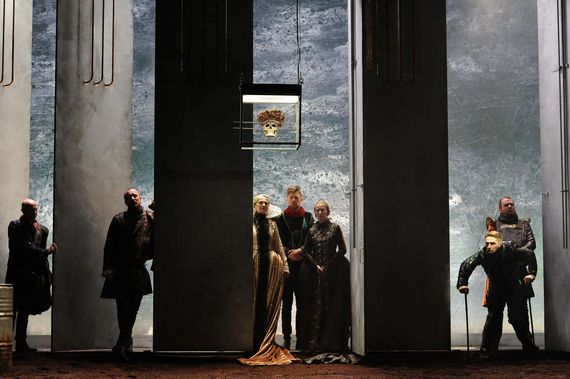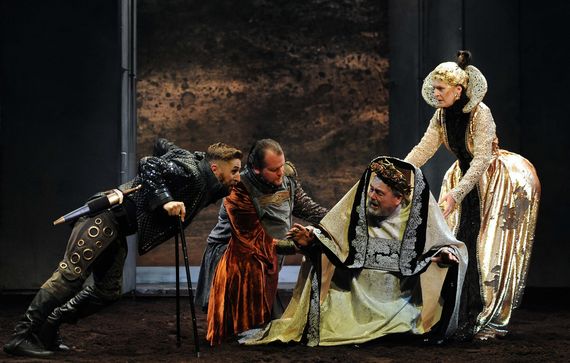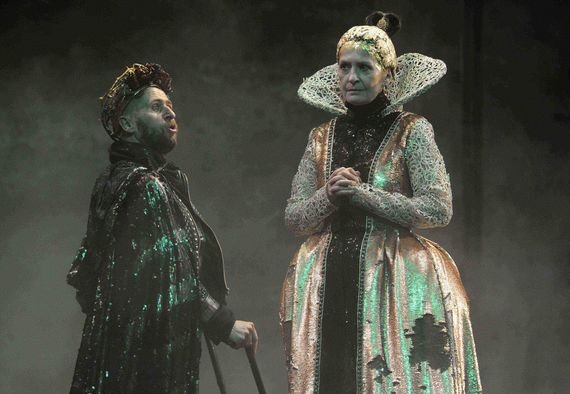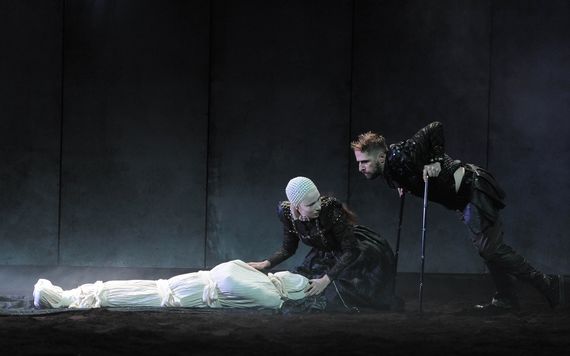This week Ireland's Druid theatre company return to New York with Richard III, a play that's over 400 years old but that feels like it's been ripped from the headlines
Richard III, the real-life monarch, had the achievements of his all too brief rule aggressively rewritten by his enemies immediately after his death. Not only were they rewritten they were maligned his modern-day defenders swear.
Perhaps no work has been more influential in regard to defining who Richard III was and what he did than William Shakespeare's play of the same name, where the Elizabethan playwright turned the medieval king into a memorable villain, in keeping with politics of his own times and also in a creative response to his own theatrical rival Christopher Marlowe.

Peter Daly, Rory Nolan, Jane Brennan, Frank Blake, Ingrid Craigie, Garrett Lombard and Aaron Monaghan in Richard III
The Irish can be particularly conscious of how the powerful can attempt to coerce and bully the less so (Brexit is a current reminder) so there is already considerable excitement about how the Galway-based company will pitch this play to a New York audience when the show opens here in previews this week.
But don't ask Aaron Monaghan, the actor in the title role, to tell you that their new production is going to be all about what's happening in the news cycle this week.
“I'm addicted to Brexit as I'm sure you're addicted to the impeachment proceedings, but what we were very clear about in this production was not to kind of make it about current affairs,” he tells the IrishCentral's sister publication, the Irish Voice.
And yet the play is unarguably speaking to our current moment, and that's what's kind of incredible about it Monaghan concedes. “It's an astonishing piece of work. It's a reminder that sometimes, just on the turn of a word or a sentence, the entire political situation can change around us.”
Read more: Heartbreak of Irish famine movingly reimagined in the United States

Aaron Monaghan, Garrett Lombard, John Olohan, Jane Brennan in Richard III
Sounds a bit like Twitter, right? Wrong, says Monaghan. “Director Garry Hynes banned the name Trump from the rehearsal room because we didn't want the play to be reduced to something so current, we didn't want to be reductive about the production or what Shakespeare is saying.”
Nevertheless, he's overjoyed about Druid's return to the U.S., with a production that has already been acclaimed in Ireland and the U.K. “We have a good relationship with the Lincoln Center Festival and it's always a joy to bring to see how an American audience will react in such a very strange times. We're very keen to see how it lands.”
It's fair to say there's some overlap between the poisonous political atmosphere of Shakespeare's play and our own political moment, though. What's also hypnotic is Richard III's remarkable ambition. It's so strong it's almost mysterious. We watch how much of himself he's prepared to sacrifice, including the people around him too, in his mad lifelong pursuit of power, a life-long sacrifice that, ultimately, is pretty meaningless.
“It's the only Shakespeare play that opens with a direct address to the audience,” Monaghan says. “Richard III tells us from his opening line. I can't deal with this peace, because I've been tempered by war, so I'm going to play a villain.”

Aaron Monaghan, Jane Brennan in Richard III
It's an amazing card to lay down to the audience at the outset, says Monaghan. “He is willing to sacrifice himself, he's willing to sacrifice so many things. I'm not sure if he knows exactly why or what the cost is. There's an argument that has been made that this play is about a man with no conscience and perhaps no soul. But the way I see the play is that he discovers that he has got a soul, but it's too late. I mean, it's an incredible piece of writing. He literally puts the crown on his head and he says, 'Shall we wear these glories for a day, or shall they last and we rejoice in them?'"
No sooner has Richard become king than he's wondering how long it will last in other words, or if and when his enemies will gather and depose him. His anxiety is so strong that you could call it a medieval version of presidential harassment.
“It's just an extraordinary study about power, what it can do to you,” says Monaghan.
“I was listening to a study about billionaires recently. They were asked how much money is enough money and they didn't quite understand the question. They didn't really know how to answer it because they forget what their initial objective was. They forget when is enough power, when is enough money, they just get caught up in the endless pursuit of it.”
Read more: Don't miss out on Conor McPherson's Dublin Carol at the Irish Repertory Theatre

Siobhan Cullen and Aaron Monaghan in Richard III
History has forced the Irish to contend with our own broken story, but in Britain – as Brexit daily reminds us - that painful exploration has been postponed indefinitely in most quarters. So there is real value in having an Irish company mine one of the creation stories of England, the better to understand what makes them and our current political moment tick.
Against the political constraints of his own time, Shakespeare still manages to write a play that presents his subject in full, in spite of the Tudor's wishes. “He starts the proceedings in a very playful way. Richard says I am going to be a bastard, come along with me. And he's very charming and very funny. But then it gets to the point in act four where I hope I make the audience feel that they had backed the wrong horse. I think the production has achieved that. But what I really wasn't expecting was that we could find some touch of pity for him.”
To live in a golden palace in the company of a mail order bride who hates you, or children who are angling to take the crown from your head, surrounded by sycophants who will stab you in the back at the first opportunity reminds us how lonely it can be at the top and how out of your mind you might have to be to even think of pursuing this path.
“It's funny you mentioned the Irish perspective on this play, because having done the other's in the trilogy in the same Lincoln Center theatre, it is really interesting for this Irish company to be taking on this very British play. Like the idea of royalty and sovereignty and monarchy is a very foreign thing to us. We're very much making it Irish. We're using our own voices and I'd say seventy-five percent of the actors from that last Druid production are here again. I think audiences are in for a roller coaster.”




Comments